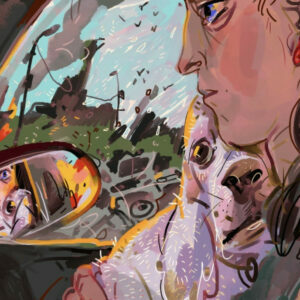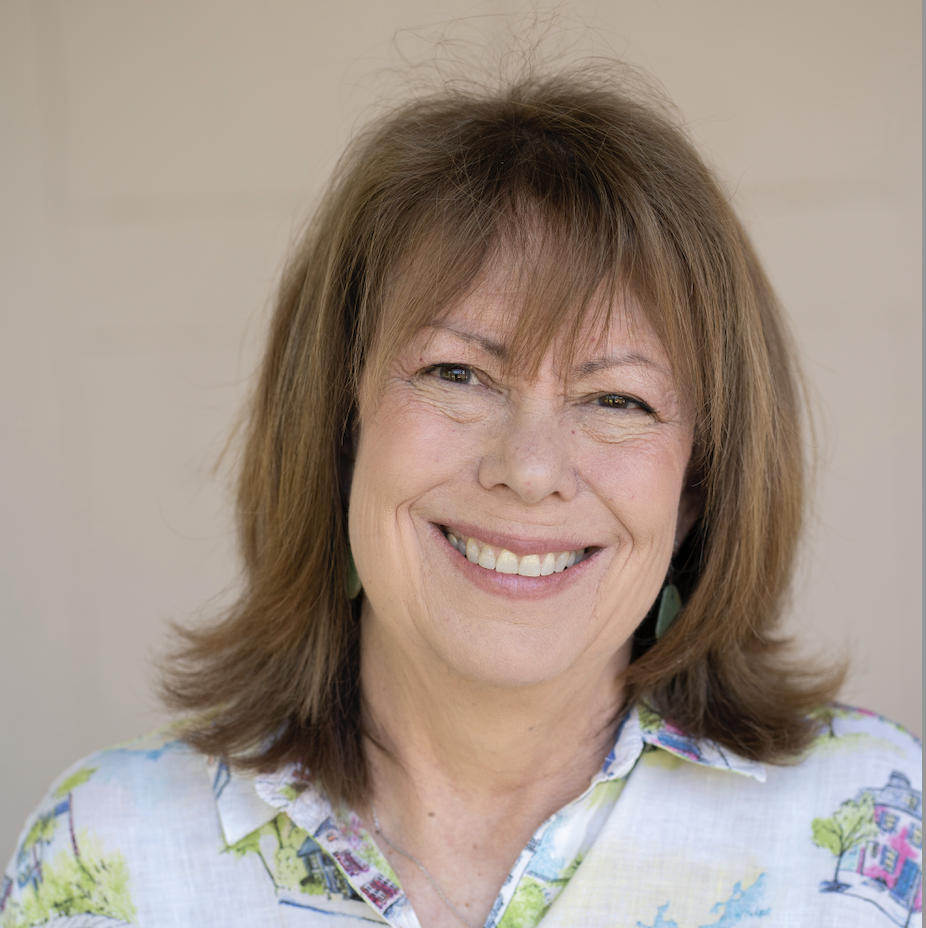“On February 24 (2022), I woke to the sound of explosions. Of course, my first reaction was to panic, and I didn’t know what to do. At that time, my son was three and a half months old,” said Hanna Zaitseva. “My husband worked at Azovstal at the time. I called him, and he told me the best thing to do was to go down to the bunkers of Azvostal.”
Zaitseva’s story is one of more than 81,000 accounts from civilian survivors of the ongoing Russian invasion of Ukraine that are archived in the new Museum of Civilian Voices.
Natalya Yemchenko, a spokeswoman for the museum, told DCJournal the project began in 2014 when Russia invaded Crimea. Separatists took over government buildings in two eastern provinces, Donetsk and Luhansk, declaring they were part of Russia, leading to fighting for control of those areas.
The Rinat Akhmetov Foundation sent teams with kits of supplies to survivors, providing assistance to 3.5 million people, according to its website. The group found survivors who received food also wanted to talk about their experiences, their survival, and their losses. When they told their stories, it helped ease their post-traumatic stress disorder.
The teams recording those civilian accounts include journalists and psychologists, said Yemchenko. The stories are from the point of view of the person telling them.
Because Zaitseva’s husband had been in the military and knew the Russian attack was moving quickly, “He said we might not have time to hide. So, we decided we would take the essentials and go down there (into the bunker).” Her parents, her husband, and her baby son came with her.
“I was a new mother,” she said. “This decision was such a challenge to me because once I came to Azovstal, I could not breastfeed my baby as I did not have breast milk.”
“The Ukrainian servicemen found formula and diapers,’ she said. “At first, I tried to save the formula because I didn’t know how long it would last…the baby was malnourished and didn’t see sunlight for two months…I could call it ‘steel motherhood.’”
Zaitseva spent 65 days in the Azovstal bunker with her baby. Before the full-scale invasion, she was a French teacher in Mariupol. Zaitseva’s husband, Kirill, is a former Marine. When his son was born, he left the military to be with his family. He found a job at the Azovstal Iron and Steel Works but later returned to the military and was later captured.
Zaitseva and the baby left the bunker under the auspices of the Red Cross, but their journey to freedom led them into a Russian filtration camp. There she was stripped naked, searched, berated by female Russian soldiers, and then interrogated because her husband was a soldier. The Russians data-mined the refugee’s cellphones and added trackers.
Hers is just one of many stories of brutality, tragedy, and survival the museum is collecting from the most massive military action in Europe since the end of World War Two.
Many of the stories are difficult to listen to.
Volodymyr Obodzinsky was at work when he learned that a Russian bomb hit and destroyed his house, killing his wife, son, daughter, and two grandchildren.
“Two air bombs came in from some Russian bastards (I don’t want to use curse language). One landed at the corner of the house, and the other bomb landed in the garden behind the garage. Three generations died here. I am the only one left,” said Obodzinsky. “Only our cat, dog, and I are left from our family.”
“No one is eternal, and my time will come too – a place [in the cemetery] has already been prepared for me,” said Obodzinsky. “But the memory must remain so that generations could know. Centuries will pass, but the memory of what the ‘Russian world’ is should stay. They are not worth even any curse words. Generations and centuries will pass, but people should know what the ‘Russian world’ is and whom it ‘helped’ in this life.”
Another survivor whose story is in the museum is Natalia Dedova, a television journalist who founded a charity, Marathon of Kindness. She was in her Mariupol apartment building with her husband, Viktor Dedov, a television cameraman, their son, Sasha, her mother, and her father-in-law when a Russian shell flew through the balcony door on March 11, 2022.
Viktor was in the kitchen cooking food when the first shell struck, she said.
“There was dust, concrete dust before my eyes, and the whole ceiling and some structures were collapsing upon us,” said Dedova. “I was screaming. Everything collapsed immediately.”
She and her mother suffered head wounds, though she believes their hats helped protect them. She called out for Sasha, and he answered.
“Then I realized we could not stay there (in the rubble) anymore,” Sasha said. “We needed to save ourselves.”
Later, Dedova looked for Viktor and found his body in the hallway in part of the building still standing. He was bleeding from a neck wound.
She said they were married 22 years and thought they had a future.
“It turned out that we had only today,” said Dedova. “Or rather, not even today.”
The testimonials are part of the museum’s online collection. They stand as a testament to the atrocities committed by Russia against Ukrainian civilians and as an emblem of Ukrainian resolve to remain a free and separate country.
The museum has an additional mission of countering Russian propaganda, Yemchenko acknowledged.
“The Russians say we don’t have a history; they try to take that away,” said Yemchenko.
The foundation hopes to work with a university to house its collection and possibly have a physical space someday. They envision an archive like Steven Spielberg’s Shoah Foundation at the University of Southern California.
“There are many, many moving stories,” said Yemchenko.
Eugene Luciw, a Ukrainian-American community organizer in the Delaware Valley, called the Museum of Civilian Voices “absolutely compelling.”
Manor College Dean Nicholas Rudnytzky mentioned the old saying, “History is written by the victors.” But, with today’s technology, “we see that (slant) is simply no longer possible.”
“The democratic traditions entrenched in our consciousness along with generations of free-thinkers added to innovations in technology has ensured that the truth, with all its warts, contractions and hypocrisies, will be documented by someone somewhere and an official party-line from a state-sponsored source will never again be its sole font,” Rudnytzky said.
“Future scholars are blessed (or cursed, depending on one’s view) of having a multitude of sources to sift through, connect and weave together to generate a proper tapestry of the past. To create and maintain a depository of such sundry sources, like what the Museum of Civilian Voices seeks to do, is of the utmost benefit to our society.
“Western scholars and Slavophiles as a whole, never properly examined, let alone challenged, the official party line that had been emanating from Moscow and St. Petersburg since the dawn of the 18th century when Russia emerged as a polity of immense proportions on the eastern frontier of Europe. The Russian denial of Ukraine and Ukrainians became a generational exercise that, seen through the focus of history, borders on the absurd,” he said.
“They denied the existence of the Ukrainian language by banning it (how or why would one even need to ban something that does not exist?) They denied the existence of the Ukrainian national consciousness by assassinating its leaders, liquidating its churches, and forcibly starving its population. They sought to erase Ukraine from any memory by renaming its lands and moving in whole villages from its more remote realms, all in the hopes of successfully usurping Kyiv’s long history and grand traditions as their own. They could not succeed.
“Even though, like today, the state in Russia controls the church, the media, and any other conduit it has to the hearts and minds of its denizens, they could never successfully succeed in their goal. Ukraine and Ukrainians endure.”
The Ukrainian diaspora is keeping their language and traditions alive, he said.
“With over 81,000 testaments, the Museum of Civilian Voices serves as a critical and important repository of their journeys, experiences, and truths. It not only will ensure that cries for justice against Russian atrocities never lack for witnesses but also serve as a testament to the undaunting and ever-enduring spirit of the Ukrainian people,” said Rudnytzky.
And founder Rinat Akhmetov, a prominent Ukrainian businessman, said, “I would like all these stories to stay un-erased from memory so that our memories remain forever. So that every human story from the Museum of Civilian Voices becomes a call to stop this terrible war and prevent such tragedies in the future.”





